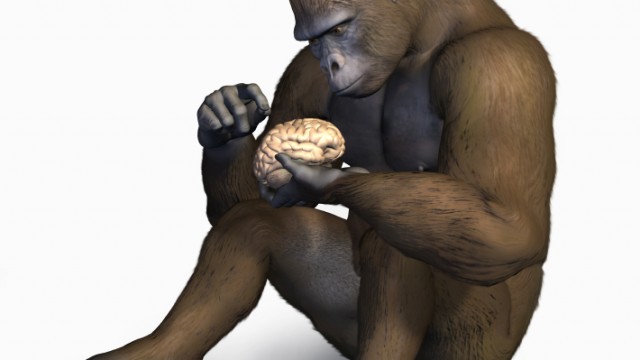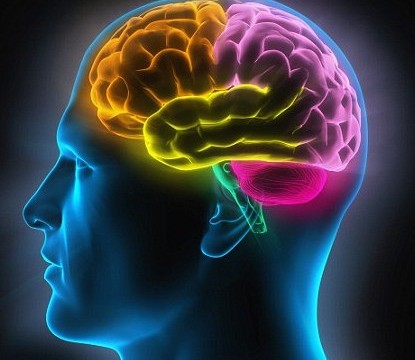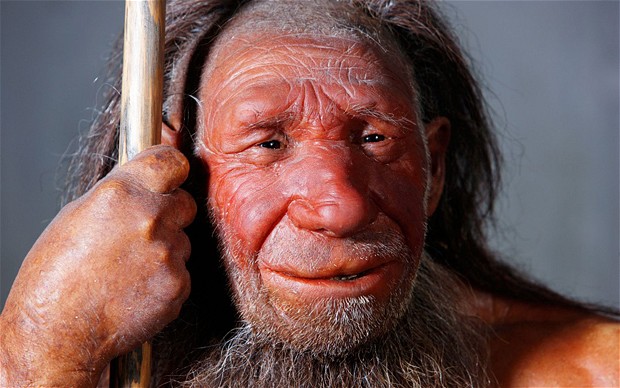Humankind stands at an evolutionary crossroads. Our species cannot continue fragmenting the natural world without inducing a collapse of natural systems. We can still change course, though it will require the awakening of a latent potential for insight within us. Is that the next step in human evolution?
 To begin to address that question, we need to understand what made us human in the first place, and how our species came to dominate the planet. Then we can see how the basic human evolutionary pattern may develop in a new way, with our conscious participation.
To begin to address that question, we need to understand what made us human in the first place, and how our species came to dominate the planet. Then we can see how the basic human evolutionary pattern may develop in a new way, with our conscious participation.
As others have also pointed out, symbolic cognitive processes are the defining element of our humanness. Symbolic processes are ‘our ability to abstract elements of our experience and represent them with discrete mental symbols.’ That means consciously separating out ‘things,’ generating names and images for them, and then manipulating them, both mentally and physically. Everything we do as humans is based on this basic ability.
The modern human brain existed in its present form for many thousands of years before some social stimulus ignited an explosive awakening of latent abilities. At that point we made the transition from essentially subconscious intuitive functioning to conscious symbolic functioning.
For example, Neanderthals were a tremendously successful but distinct human species, which had achieved the zenith of a lifestyle based on intuitive processes alone. But then came the Cro Magnons, having developed and migrated from Africa (as have all previous hominid species). They were modern humans, Homo sapiens sapiens—a double misnomer, since it literally means ‘wise, wise humans’. The evidence suggests that our species, with minor intermingling, displaced and drove into extinction our cousins, Homo neanderthalensis.
Before 100 thousand years ago, there is very little evidence of symbolic cognitive functions. However after 40 thousand years ago in Europe (and probably well before that in Africa, though there is less evidence there so far), there is abundant evidence that an entirely new order of being had emerged. In cave art, in tool making, in sculpture, engraving, music, elaborate burial of the dead, and much else, human culture as we know it had suddenly appeared.
There are two shibboleths that have become common intellectual currency: the idea that evolution works through gradual progression toward a perfected form; and the idea that ready-made adaptations emerge through natural selection, making creatures more fit to compete.
In actuality, most if not all innovations in nature arise through a process called ‘exaptation,’ which means that ‘a characteristic arises in one context before being exploited in another.’ The classic example is birds’ feathers, which, millions of years before they were used for flight evolved for insulation.
Clearly, the modern human brain arose for some other reason, but was later ‘exapted’ for the uniquely  powerful symbolic and cultural purposes that humans have been using it for tens of thousands of years.
powerful symbolic and cultural purposes that humans have been using it for tens of thousands of years.
Disturbingly however, the evolution of cognitive symbolic processes (that is, conscious thought) carried with it the inexorable tendency to eventually fragment the earth to the point of ecological collapse.
This raises huge philosophical questions, foremost being: How could evolution produce an exaptation/adaptation so at odds with the rest of nature?
The human brain evolved for survival purposes in a goal-less, non-linear way, and only much later was ‘exapted’ for symbolic thought. That exaptation enabled us, Homo sapiens, to have language, culture, art and science.
No one knows what drove the brain’s enlargement, but the logic is inescapable: morphology precedes, not follows innovation in nature. In other words, nature can only produce innovations (like flight, or symbolic thought) out of structures that already exist; it doesn’t develop structures for a particular use. That is the meaning of exaptation, whereby evolution produces innovations in one context that are later used for other purposes.
Given the global ecological, psychological and political crisis of humankind, is there an exaptation that’s waiting to be released that will enable us to meet the present climacteric? I feel so, ant that is related to a universal capacity for what is often pejoratively labeled mystical experiencing.
Humankind is in a headlong rush to fragment nature, culture and the human psyche into billions of bits (and bytes), producing a decimated planet inhabited by billions of deracinated people. Can normal people living normal lives (whatever normal is anymore) awaken the human capacity for states of insight?
We humans were given the Promethean fire of symbolic thought, but we have been using this gift to plunder the planet and are fragmenting the earth and ourselves to the breaking point. So the million-year question is: Is the human brain exapted for awakening, just as it was exapted for symbolic thinking?
It stands to reason, since there is a dynamic order and immeasurable intelligence inherent in nature. I don’t mean design, via a deus ex machina (that’s thought projecting itself) but rather, a ground beyond thought.
The prevalent idea in science that life is just random and relative activity founders, ironically, on the disorder humans are generating. Humans don’t bring order, but chaos to the earth. And since we evolved along with all other life, something else is going on with us.
 The word evolution has come to connote gradual change toward greater perfection. But those who study organisms in nature now generally agree that evolution is not evolutionary but revolutionary. That is, long periods of stability and even stasis are ‘punctuated’ by short bursts of major change.
The word evolution has come to connote gradual change toward greater perfection. But those who study organisms in nature now generally agree that evolution is not evolutionary but revolutionary. That is, long periods of stability and even stasis are ‘punctuated’ by short bursts of major change.
A radical change occurred when the human brain was rapidly rewired and reconfigured for symbolic cognitive processes. That gift (and curse) carried with it the necessity of self-knowing and self-understanding, because without it, humans cannot stop dividing and fragmenting.
Just as the pre-modern human brain contained the potential for conscious thought, our present brain, which is generating more and more fragmentation using thought unwisely, contains the capacity for insight sufficient to enable us to use thought wisely. Indeed, the brain is exapted for states of insight beyond thought altogether. That is meditation.
Humankind is standing at a critical juncture, just as our ancestors unconsciously did before conscious thought and culture exploded onto the scene. Unlike them however, our awareness of the next step in our evolution (which has nothing to do with merging our computers with our ‘still evolving brain’) is indispensable to making the leap.
One feels, in these contemplations, a compassion of the universe for humans in our terrible dilemma. That fits, since humans didn’t ask for the Promethean fire of symbolic thought. But it’s our urgent responsibility to understand ourselves and awaken.
Martin LeFevre

